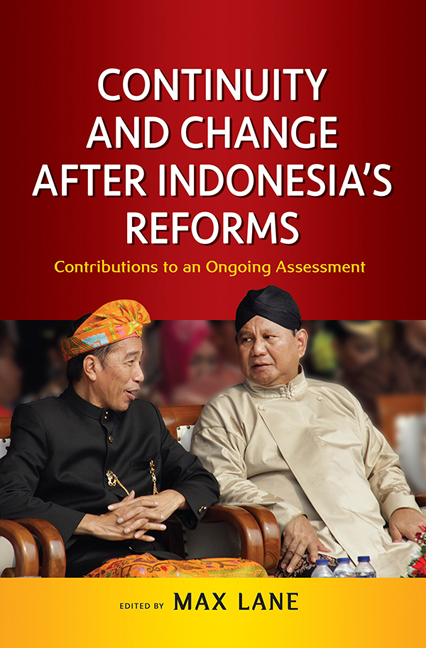Book contents
- Frontmatter
- Contents
- Preface
- About the Contributors
- 1 Indonesia's New Politics: Transaction Without Contestation
- 2 Indonesian Parties Twenty Years On: Personalism and Professionalization amidst Dealignment
- 3 Ideologies of Joko Widodo and Indonesian Political Parties
- 4 Political Islam Movements and Democracy in Indonesia: A Changing Landscape?
- 5 Creating Leadership Legitimacy in Post-Reform Indonesia
- 6 The Political Middle Class in Post-Soeharto Era Indonesia
- 7 The Politics of Centre–Local Relations in Contemporary Indonesia
- 8 The Roots and Actors of Corruption in the Political Realm
- 9 Why Is It Really Hard to Move On? Explaining Indonesia's Limited Foreign Policy Reform After Soeharto
- 10 Papua under the Joko Widodo Presidency
- 11 Youth “Alienation” and New Radical Politics: Shifting Trajectories in Youth Activism
- Index
7 - The Politics of Centre–Local Relations in Contemporary Indonesia
Published online by Cambridge University Press: 06 September 2019
- Frontmatter
- Contents
- Preface
- About the Contributors
- 1 Indonesia's New Politics: Transaction Without Contestation
- 2 Indonesian Parties Twenty Years On: Personalism and Professionalization amidst Dealignment
- 3 Ideologies of Joko Widodo and Indonesian Political Parties
- 4 Political Islam Movements and Democracy in Indonesia: A Changing Landscape?
- 5 Creating Leadership Legitimacy in Post-Reform Indonesia
- 6 The Political Middle Class in Post-Soeharto Era Indonesia
- 7 The Politics of Centre–Local Relations in Contemporary Indonesia
- 8 The Roots and Actors of Corruption in the Political Realm
- 9 Why Is It Really Hard to Move On? Explaining Indonesia's Limited Foreign Policy Reform After Soeharto
- 10 Papua under the Joko Widodo Presidency
- 11 Youth “Alienation” and New Radical Politics: Shifting Trajectories in Youth Activism
- Index
Summary
Background
One of the earliest and most significant transformations implemented as part of reform in Indonesia since 1998 has been the restructuring of relations between the national government in Jakarta and local governments. In the early years of independence, demands for representation and access to resources and economic activities led to what were widely termed “regional rebellions” in several parts of Indonesia: Aceh, West Sumatra, and North and South Sulawesi. Incidents between 1950 and the early 1960s, which Harvey (1977) labelled “half-hearted rebellions”, led to the creation of new autonomous regions (provinces, regencies, cities) as well as the granting of special autonomy to Aceh. At the same time, as late over the course of the New Order, the government promoted the migration of local capitalists to Jakarta, where they either entered new activity spaces or lost their local living spaces. Examples are the migration of local entrepreneurial families — such as Kalla, Hasyim Ning, Bakrie, etc. — and the end of local economic dynasties, such as the Pardede in North Sumatra. As will be discussed in further detail, the demand to restructure centre–local relations after 1998 marked a reversal of this trend, as local entrepreneurial forces became stronger and offered an alternative means of recruiting local political elites.
Under the authoritarian New Order regime, such demands were never openly voiced. However, haunted by the spectre of previous regional rebellions, Jakarta took a number of preventive measures aggressively to consolidate its power through its increasingly strict regional penetration and control. This meant rampant centralization, which occurred together with widespread standardization. Over time, this created highly unbalanced power relations, “Jakarta” seemingly becoming synonymous with Indonesia as a whole (Lay 2001).
The central government's preventive measures were comprehensive. First, they included the creation of a military structure parallel to the civil one, from the (inter-)provincial level — represented by the Regional Military Command (Komando Daerah Militer) — to the village level — the Village Guidance Unit (Bintara Pembina Desa, Babinsa). Military commanders at each level became part of the local strategic decisionmaking institution known as a “council of leadership” (musyawarah pimpinan) at the regional (provincial/regency/city) and district levels.
- Type
- Chapter
- Information
- Continuity and Change after Indonesia's ReformsContributions to an Ongoing Assessment, pp. 147 - 170Publisher: ISEAS–Yusof Ishak InstitutePrint publication year: 2019



